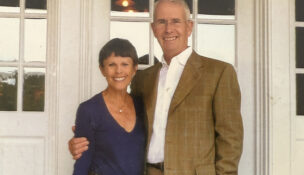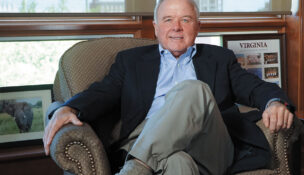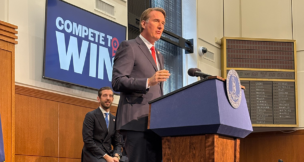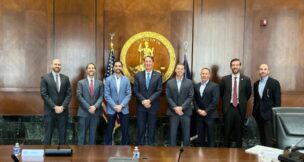Finishing touches
Schools help students learn and practice critical ‘soft’ skills
Virginia Business //December 30, 2014//
Finishing touches
Schools help students learn and practice critical ‘soft’ skills
Virginia Business //December 30, 2014//
In early 2013, José Bustillos, a sophomore accounting major at the University of Richmond, was struggling to navigate college life challenges when Shelley Olds Burns stopped by one of his classes. Burns, director of the Center for Professional Skills and Development at UR’s Robins School of Business, invited students to an upcoming program known as Q-camp.
Bustillos wasn’t enthusiastic. “To be honest, I had enough on my plate just starting to dive into business school,” recalls the Tucson, Ariz., native. “The only reason I went was because my professor strongly suggested that I go.”
The Q-camp process, the brainchild of Paul B. Queally, a UR alumnus who heads a New York private-equity firm, is a 3-year-long series of events designed to give undergraduate business students opportunities to meet with business professionals and learn real-world career skills.
Bustillos, now a senior, is glad he tried the program. The experience motivated him to think well beyond his academic load, gave him new confidence and over time directly led to a job offer from a top accounting firm.
“I didn’t understand at first how it would help me, but when I got there and started to meet all these professionals doing what I love, well, it gave me a lot of motivation to improve myself in these areas and learn what was necessary to make me a better candidate and eventually a better employee,” he says.
Preparing students for the nuances of the business world is not a new endeavor, but school officials have intensified their offerings in recent years as the recruiting process has become more competitive.
Employers no longer base hiring decisions on top grades and well-written résumés. They expect business school graduates to have professional polish and the ability to communicate, negotiate, network, collaborate and be team players.
Hitting the ground running
In a 2014 survey conducted by Harris Poll on behalf of CareerBuilder, 77 percent of responding employers said these “soft” skills are just as important as the technical skills an employee needs to perform a job. Sixteen percent of respondents said soft skills are actually more important.
“Employers are getting to the point that they expect students to be able to hit the ground running, unlike in the past where it was more acceptable to learn a lot of this on the job,” says Tom Fitch, associate dean for career services and employer relations at the University of Virginia’s McIntire School of Commerce, which offers etiquette dinners, networking events and workshops. “They expect this type of skill set to be well-established. They look for evidence of it in interviews, and they look to see what experience students have had to prove that they can communicate effectively with clients and interact with peers and work in a group setting.”
Other driving factors in this approach are the general loosening of the social structure and the trend toward less personal, electronic communication. Compared with previous generations, millennials spend more time texting and less time in face-to-face conversation. They also have had fewer opportunities to attend functions or classes where manners and etiquette are taught.
By contrast, the business culture remains highly structured, with its own set of social rules and etiquette standards, clear expectations of what is and is not professional behavior, and a strong reliance on personal interaction and relationship building.
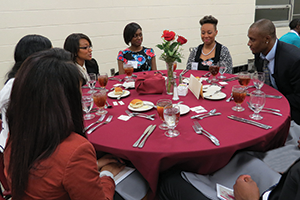
To prepare students to enter the work world, Virginia business schools are teaching a variety of non-academic skills. They include the basics of playing golf, crafting and using a LinkedIn profile, and strategically entering and exiting a conversation.
Jordan Young, a UR senior, says his Q-camp experience helped him differentiate himself during a summer internship as an equities investment analyst at Guggenheim Global Trading in Purchase, N.Y. Young, who played golf competitively in high school, was advised to play up that fact on his résumé, and during his internship he ended up hitting the links with some of the firm’s senior executives.
“Because of the Q-camp experience and all the interaction I’d had before this, I understood that success was going to be as much about how I managed relationships as it would be about knowing how to pitch a stock or value a company,” he says. “I felt really comfortable in that environment because I had a much deeper understanding of how to network and knew a lot of the unwritten rules, like what’s appropriate to talk about and what’s not appropriate and how to keep in contact with people.”
Same goal, different approach
Virginia schools, by virtue of their demographics and size, are taking different approaches to bringing students up to speed on the realities of life in the work world.
Brown’s team, for example, puts on etiquette dinners and leadership training programs while inviting students to personalized sessions with career counselors. Networking events with local employers also are held on a regular basis.
“Everything is happening much earlier than it did before, when the first interaction with an employer was likely to be that first job interview,” Brown says. “Employers want to meet potential recruits even before they hire for internships, and students have to be prepared for that. They have to know how to present themselves with confidence, they have to know how to shake someone’s hand and look them in the face and have a conversation with that person on the spot.”
Kathleen I. Powell, assistant vice president of student affairs and executive director of career development in the Cohen Career Center at the College of William & Mary, agrees, noting that schools are able to put on intensive programs because outside forces are more willing to get involved. These include alumni, employers and even parents.
“The way we do career services has definitely shifted to more of an engagement model as opposed to the old placement model where an employer came and did on-campus recruiting, offered a student a job, and that was it,” Powell explains, pointing out that the Mason School of Business surveys employers each year to find out what soft skills they’re looking for in candidates. “Now, it’s all about those touch points with our external constituents and partners who are champions for our students and giving students opportunities to practice and make mistakes with those champions rather than just going out there and stubbing their toe on the real deal.”
Mason students can interact with these participants in etiquette dinners, mock interviews and “work the room” events. Powell’s team also puts on quick, informal “meet-ups” and “connect” opportunities with employers and business professionals that are pushed out using the school’s Twitter feed, Facebook page and other social media tools.
“We have a lot of what look like ‘one-offs’ but on the backside, it’s all part of this program schedule that reinforces what we’re constantly teaching about career etiquette and the business culture they’re going to be entering,” she says.
Virginia Tech’s Pamplin School of Business also offers cultural and etiquette training, though it can’t be quite as programmatic as other schools, largely because it has over 4,000 enrollees.
“It’s a little bit different level of service: We have to kind of shepherd the flock, moving them from one direction to the other, as opposed to maybe taking the staff and reeling them in,” says Stuart Mease, the school’s director of undergraduate career services, explaining that he visits at least 100 classes a year as part of his efforts to recruit participants. “Sometimes we have to hit them with several messages before they really get how important this is.”
Students get out of the program what they put into it, Mease says. “It’s a little bit like Virginia Tech as a whole: They can make it as big or as small as they want it,” he explains. “We’re here, and we try to help them as much as we can, but they’ve got to really make the effort.”
Getting students to understand how important these less tangible, less academic skills are to business success remains a hurdle for business schools, Powell admits.
“A lot of students want to prepare for the business world like they have college with a check-the-box list, and we’ll go over the soft skills that employers want and students will say, ‘I got that skill and that skill,’” she says. “And my response is: It’s one thing to ‘have’ them, but you need to be able to talk about them and demonstrate them in a job interview and on the job. And to do that, you have to practice while you’re in school — and practice a lot.”
The softer side of learning
Virginia’s business schools offer a range of programs and opportunities for business school students to refine their soft skills and business etiquette. The following is a sampling of what’s available:
University of Virginia — The McIntire School of Commerce’s Career Services and Employer Relations Department offers etiquette dinners, structured events around networking, an employer-in-residence program and a variety of workshops, including some geared to introverts who are less comfortable in social situations. Third- and fourth-year students also have a chance to immerse themselves in the business culture during New York networking trips.
Virginia Tech — The Pamplin College of Business offers mock interviews, résumé workshops, branding strategy sessions, networking events with company officials and one-on-one counseling. Virginia Tech’s Division of Student Affairs also holds an annual etiquette dinner.
University of Richmond — Q-camp is a 3-year-long soft skills program that gives UR’s Robins School of Business students an opportunity to learn how to: develop a professional network, assess organizational culture, use LinkedIn effectively, create a personal brand, adopt dining and workplace etiquette and network during a golf game. The sessions are designed to work in concert with mentoring and executive-in-residence programs.
Virginia Union University — The Career Services Department provides a number of events designed to prepare all university students for the work world, including etiquette dinners, leadership training programs, networking events and one-on-one counseling.
Old Dominion University — ODU’s College of Business and Public Administration’s Executive Mentor Program partners high-achieving undergraduate business students with executives, entrepreneurs and public-sector leaders to help them practice networking, communications and other soft skills.
Virginia Commonwealth University — VCU’s School of Business Career Services offers students the opportunity to attend etiquette dinners with faculty and local employers, participate in mock interviews and interact with company representatives at employer information sessions.
James Madison University — JMU’s Career and Academic Planning Department provides career-related workshops on a number of soft-skill topics, including speed networking, interview and dining etiquette and career attire, as well as practice interview sessions and networking opportunities with employers.
George Mason University — The School of Business offers an “Ask the Professional” Career Panel and Networking series, as well as practice interview sessions with local businesses. The George Mason Alumni Association also holds an annual etiquette dinner that provides networking opportunities.
College of William & Mary — The Cohen Career Center works with the Mason School of Business to help students learn soft skills such as networking, self-branding and face-to-face communications through programs such as a five-course etiquette dinner, weekly networking events, mock interviews and various employer-student connection opportunities, including “Meet the Firms Friday” and “From DoG Street to Wall Street.”
<


